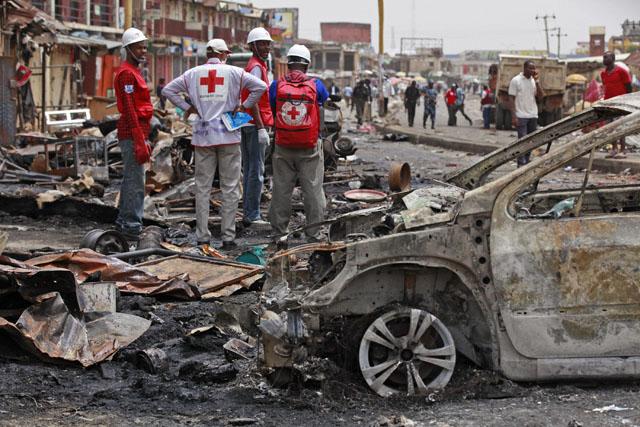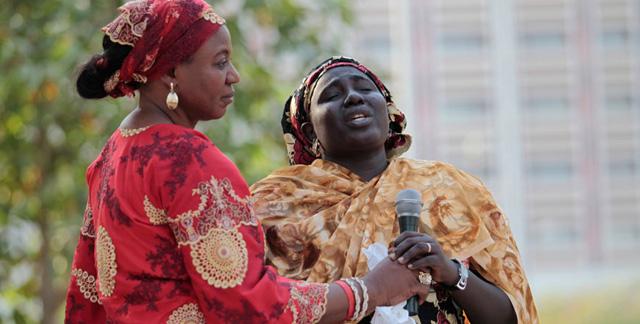You are here
Hundreds feared dead in ‘massive’ Boko Haram village raids
By AFP - Jun 05,2014 - Last updated at Jun 05,2014

MAIDUGURI, Nigeria — Hundreds of people may have been killed in a suspected Boko Haram attack on four villages in northeast Nigeria, a local lawmaker and residents said on Thursday.
Gunmen in military uniform struck the Gwoza district of Borno state late on Tuesday, razing homes, churches and mosques, and killing residents who tried to flee the violence.
Some community leaders put the death toll in the attacks as high as 400 to 500, although there was no independent verification of the claim because of poor communications and difficulties by the emergency services in accessing the area.
If confirmed, the attack on the villages of Goshe, Attagara, Agapalwa and Aganjara would be one of the deadliest in the Islamists’ deadly five-year insurgency, and top the more than 300 who were killed on May 5 when militant fighters laid siege to the nearby town of Gamboru Ngala.
“The killings are massive but nobody can give a toll for now because nobody has been able to go to that place because the insurgents are still there. They have taken over the whole area,” lawmaker Peter Biye told AFP.
“There are bodies littered over the whole area and people have fled,” added Biye, who represents Gwoza in Nigeria’s lower chamber of parliament, the House of Representatives.
‘Hundreds of bodies’
Reports from the remote region, said the insurgents continued their attack on Wednesday, stealing livestock and food, and burning property.
“Hundreds of dead bodies are lying there... because there is nobody that will bury them,” said one community leader in Attagara, who requested anonymity.
He said the attackers only spared women and that young boys were “snatched from the backs of their mothers and killed”.
Men, women and children fled the villages but gunmen on motorcycles tracked them down, shooting as they ran, he added.
Gwoza shares a border with Cameroon and is surrounded by mountains and the Sambisa forest, a known Boko Haram base and the focus for a Nigerian military search for more than 200 schoolgirls kidnapped on April 14.
Many people fled across the border, as soldiers were deployed to fight the heavily armed Islamists, who took over at least seven villages hoisting their black flag, Biye said on Wednesday.
The community leader called the situation a grave “humanitarian crisis” while others called for relief agencies to be allowed in to enable the dead to be buried.
Another, Zakari Habu, said: “The women and elderly men in our villages also need food and water. The injured need drugs and all of them need shelter.”
A revenge attack
Military jets bombarded Boko Haram positions in the affected area to try to flush out the insurgents, Biye said on Wednesday.
In mainly Muslim Goshe, where the entire village of about 300 homes was razed with several mosques, local resident Abba Goni said “at least 100 people were killed”.
Bulus Yashi, who lives in predominantly Christian Attagara, said the attack seemed to be a reprisal after four Boko Haram gunmen were killed after they opened fire on a church, killing nine.
Another attack on May 25 had been repelled, killing seven Boko Haram gunmen, he said.
“We believed they came on a revenge mission,” he said.
Residents had allegedly sought assurances from the military that they would be protected from reprisals over Sunday’s church attack but they claimed that no troops were sent.
There was no immediate word from the local military, police or state government when contacted by AFP.
Boko Haram Islamists have recently stepped up raids in northern Borno state near the borders with Cameroon, Chad and Niger, pillaging villages, looting food stores and killing residents.
The attacks are generally seen as response to villagers forming civilian vigilante groups against Boko Haram, who in turn accuse locals of helping the Nigerian military’s counter-insurgency.
Civilians have increasingly been targets of the violence and more than 2,000 are estimated to have been killed this year alone.
In February, the United Nations said that nearly 300,000 people, more than half of them children, had fled their homes in northeast Nigeria since a state of emergency was imposed in May last year.
Related Articles
Suspected Boko Haram militants have seized a military base in northeastern Nigeria in a series of blistering raids near Lake Chad, sending soldiers and civilians fleeing, witnesses said on Sunday.
Nigerian President Goodluck Jonathan Thursday vowed total war against terrorism as the country’s security forces stepped up efforts to rescue more than 200 schoolgirls kidnapped by Boko Haram Islamists 45 days ago.
Dozens of Nigerian women who were forced to marry Boko Haram fighters were reportedly slaughtered by their "husbands" before a battle with troops in the northeast town of Bama, multiple witnesses said Thursday.

















